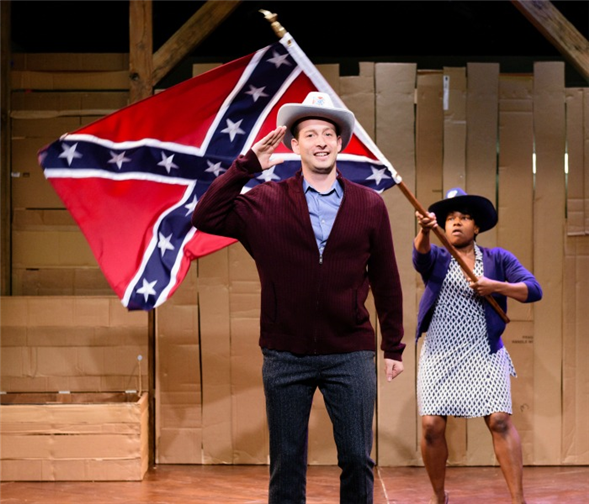Translate Page

Using outrageous satire to root through America's past
---
If laughter is the sound of surprise, then there were many surprises the night I saw Underground Railroad Game, playing at Ars Nova through October 29. But one laugh in particular keeps bouncing around my head.
In the piece -- which was created by its stars, Jennifer Kidwell and Scott Sheppard -- Teacher Caroline and Teacher Stuart are on a date. We've seen them awkwardly corral a roomful of fifth graders (the audience becomes the students), but now they're strolling along a street sipping supersize sodas. Their flirtation begins harmlessly enough, but soon their quips become outrageous.
"I can imagine you behind a giant oak desk," says Teacher Caroline (Kidwell), a smile across her face. "Bent over it, pants pooled around your ankles while a bored prostitute lazily [stimulates you] with your own paperweight. You're crying salty tears into a glass of single malt scotch and wondering how it all...slipped away." When I saw the show, this outré image, along with Kidwell's pitch-perfect delivery and the beat that followed, got a huge laugh. The actors waited to continue, but as the room grew quiet, an audience member said, with equal parts despair and deadpan irony, "Oh my God." At this, even louder laughter erupted, and once again the actors patiently waited for the noise to subside before continuing with the scene.
To me this moment captures the essence of Underground Railroad Game, a play that is so dangerously and delightfully layered that it constantly reinvents itself, shape-shifting from scene to scene, while also asking audiences to decide if and when laughter is acceptable.
Yet for all its extremes, the show is based on true events. A teaching unit in Sheppard's fifth grade class in Hanover, PA -- a stone's throw from Gettysburg -- involved dividing students into two armies, Union and Confederate. Their task was to move dolls from box to box in an approximation of the Underground Railroad, and whichever army won more points also "won" the war. This story, along with an Antebellum tale and a type of romance between the teachers, is grafted onto show, which Kidwell and Sheppard began creating in 2013.
"The initial provocation was the fact that I had played this game at my school," says Sheppard. "From there it got us thinking about other bizarre objectification traps and hypocrisies in the American narrative of slavery; these very forgiving and romanticized tropes and clichés that persist in the narrative around slavery. So we started to expand the thinking beyond just the game, but it still revolves around the teachers and the students."
Another initial impulse came when the duo, who met when they were students in Pig Iron's first class for Advanced Performance Training in 2011, attended a lecture about the Underground Railroad at Philadelphia's National Portrait Gallery. The lecturer, a white man, kept getting tripped up on language. "At first he was using 'Negro' in a historical way, then he'd switch to 'black person' then it'd be 'African-American,'" Kidwell recalls. "It was amazingly awkward."
Race is never not topical, but Kidwell and Sheppard are quick to point out how in the three years since they began developing Underground Railroad Game, the country's attention to race has heightened. But neither artist wants to make didactic proclamations. Rather, they dig into the mess of history to ask thorny questions. Who is allowed to laugh at what? And when? Are we reveling in our past or are we learning from it? Can objectification be a tool for empowerment or is it always a tool for control?
"I think humor allows us to hear and claim truths in a way," says Kidwell. "We gain access because humor touches on pleasure points and it does it in the most honest way possible. In some ways when something is funny, you hear it twice. It pleases you and it's fun, but it sticks with you because it's also true."
The man who said "Oh my God" was sitting close to me, and I watched him throughout the performance. He wasn't laughing, but then laughter isn't Kidwell and Sheppard's only aim. "We're trying to present the truth as we see it," says Kidwell. "Maybe that's funny and maybe it's not."
Sheppard adds, "We're using a dark and twisted comedy that moves from harmless to harmful on a dime and in ways that are difficult for people to process, but can be helpful in terms of its ability to disorient."
I was certainly disoriented after the show. I left the theatre dizzy from the layers of history, but also giddy from the serious clownery on hand and the bold exploration of America's past and present.
---
Writer and performer Eliza Bent is a regular contributor to TDF Stages.
Photos by Ben Arons. Top photo: Scott Sheppard and Jennifer Kidwell.
TDF Members: Go here to browse our discounts for theatre, dance, and film.